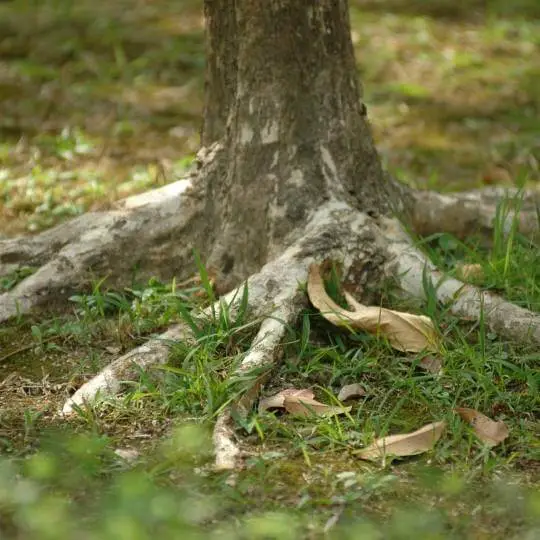Will vinegar kill tree roots? Do you know how to eliminate roots in your backyard once for all? Let’s find out.
Tree roots can, sometimes, act like landscape ornaments, still, this whole landscape designing game can spiral out of control (literally). In fact, most tree roots and stumps eventually turn into a nuisance, which is when you will start looking for ways to get rid of the unsightly and troublesome ones.
And then, you will come across various solutions, such as – paying for costly professional service or digging across the entire yard.
Today, we’re here to tell you about natural, budget-friendly recipes you can use to handle those tree roots, and one of the main ingredients of these DIY remedies is (it’s not that hard to guess) – vinegar.
Vinegar is strongly acidic, which is why many people use it to kill weeds in their yard. It’s true – pure vinegar, distilled white vinegar, or horticultural vinegar can truly help you combat pest-like plants, however…
Will vinegar kill tree roots in the sewer line? It depends.

To be able to kill older tree roots with vinegar, you will actually need another powerful agent, which we will reveal in just a couple of minutes. If you want to make an effective tree root killer, make sure to stick around!
Will Vinegar Kill Tree Roots and How?

If you are looking for more natural, non-toxic ways to kill tree roots and stumps in your yard, vinegar is the way to go. Vinegar is indeed one of the most effective and best organic alternatives to glyphosate and other systemic herbicides [1]. And, if you ask us, we would always recommend using chemical control as a last resort when trying to fight or kill tree roots. Not only using vinegar is more eco-friendly but it is a much safer option as well.
Interestingly, horticultural vinegar is used by many gardeners for germination. However, in today’s scenario, you are going to use undiluted white vinegar or horticultural vinegar in large volumes, which will, inevitably, damage the plant and its roots.
Keep in mind that using vinegar that has only 5% acetic acid won’t do much when it comes to older and stronger tree roots. The same applies to vinegar that has 9% of acetic acid, also known as pickling vinegar, despite the fact it is almost as twice as strong as regular household vinegar.
Yet, what can you do if pickling or regular vinegar is not strong enough to kill tree roots? Use vinegar that contains 10-20% of acetic acid [2]. Do not, under any condition, use horticultural vinegar for any other application since this type of vinegar burns almost anything it touches. So, note that using horticultural vinegar can sometimes get dangerous and you should protect yourself from burns.
Also, note that, just in case you accidentally spray some of the leaves when spraying the tree roots, and the leaves die, this is not the sign that the whole tree is dying.
You are going to need 2 cups of vinegar and 1 empty spray bottle. Fill the bottle with vinegar and start spraying it onto the tree roots or shoots. Make sure the weather is pleasant, preferably warm and dry. If it rains, there is a chance the rain will dilute vinegar and reduce its effectiveness. Spray the critical spot multiple times throughout the day to make the roots die or repeat the process several times in a row. It takes just a few hours for vinegar to start working.
Note that vinegar of this acidity will kill almost anything it touches, or – 85% of weeds in almost any stage of growth. That is why you should spray it directly onto the tree roots. If you don’t want to kill other plants in your yard, it would be great if you could drench the area. If you don’t do so, you may affect the soil in your backyard and its pH level, and kill other nearby plants.
Alternatively, you can drill small holes around the tree and the roots and pour a generous amount of vinegar in there. If you want to kill tree roots but also the tree itself, fill these holes with a tree killer and, once the tree and the roots are dead, pour some potassium nitrate stump removal granules in these holes and add some water as well.
How to Make a Foaming Root Killer?

To make a foaming root killer, you are going to need vinegar, baking soda, hot water, and regular table salt. This type of root killer is the most effective. In fact, it is so powerful even professional plumbers use it instead of chemical products such as copper sulfate crystals and similar.
To make this DIY foaming root killer, mix the above-mentioned ingredients, pour the mixture down the toilet immediately, while making sure you are flushing it down into the lowest toilet in your home.
As you can already guess, this tree root killer produces a fizzing reaction in the pipes. That is actually a good sign, and, in just a few minutes, table salt will start attacking the roots. It may take a day or two for the mixture to kill the roots. In fact – they will become dry, but keep in mind they won’t get washed away. You will have to find a way to remove these roots out of your system.
You have 2 options. The first one is to try homemade root killer solutions or to buy chemical root killers for sewer lines.
How to Kill Tree Roots – Bonus Tips

- To kill tree roots, you should obstruct the air from reaching them. You can always pave over them or cover the roots with mulch, which will, eventually, suffocate them.
- If there is no other way to kill tree roots, maybe you should start thinking about cutting the tree down. The outer limbs should be taken down first, then you should move onto the remaining truck. You can use vinegar or table salt to kill the roots even in this case since the process will take significantly less time than when the tree is alive.
- If tree roots continue to harass you and continue to grow back even after the tree has been cut down, the best way to get rid of them is to go for herbicides. Drill into the tree trunk and fill it with herbicides. Make sure to get familiar with all local, state, and Federal laws before and when applying herbicides.
- In order to get rid of unwanted stumps, we suggest building a compost pile, that will speed up decay, on top. You can then turn the stump into a flower container.
Summary
Although incredibly lovely, trees are sometimes growing in the wrong places. And, if you don’t want to go against the norm or opt for chemical solutions, vinegar can help you get rid of stubborn tree roots safely and effectively.
So far, we believe you got clear answers to questions like “will vinegar kill tree roots in sewer line” or “what can I use to kill tree roots in my sewer line”. Yes, you can use vinegar that has a 10-20% concentration of acetic acid to get rid of tree roots. Vinegar is an organic root killer you can certainly use for killing other weeds and grass in your yard.
In the end, there is no guarantee vinegar will actually kill those tree roots, especially if they are full grown. If it doesn’t, simply switch to a chemical product, and – job done. You can also use vinegar periodically to effectively control nasty weeds, although you should be careful not to overdo it, otherwise, you may disrupt the soil’s pH.

Michael Davis is a heating & plumbing expert who currently works as independent contractor in SC. He also writes for Plumbertip.
For almost 10 years he worked on various plumbing tasks across South Carolina.



